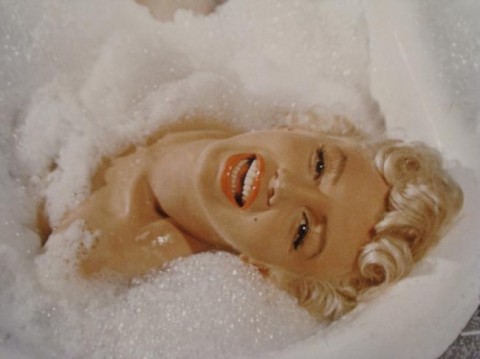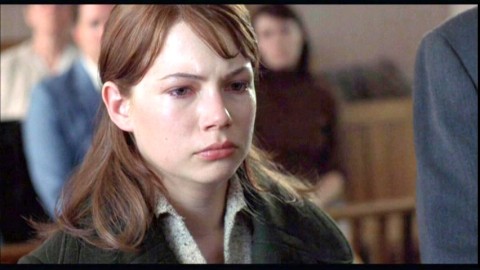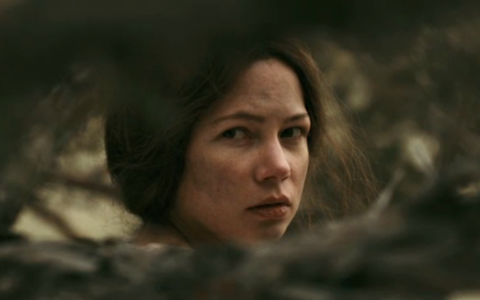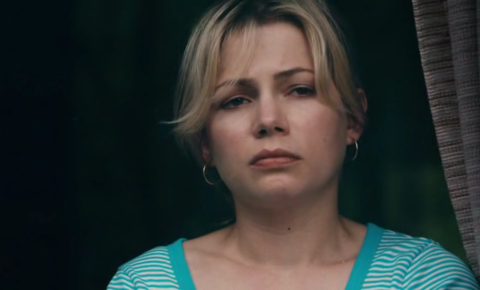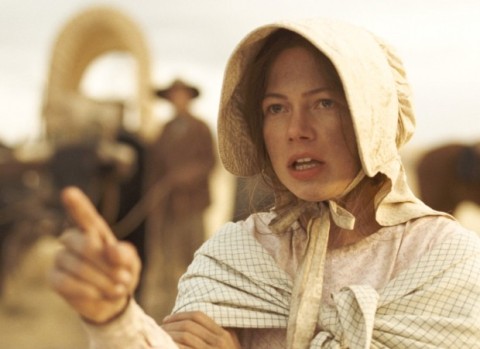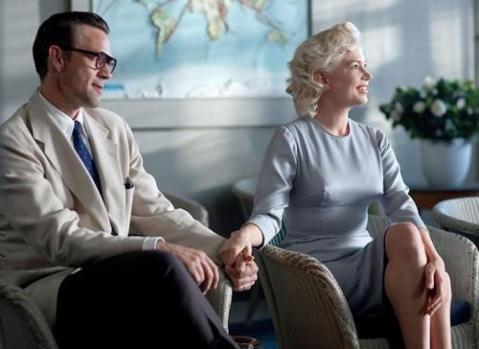Michelle Williams’ mouth
2 July 2012
Michelle Williams’ mouth is the thing I stare at when I watch her. As an actress she can be a chameleon — I mean, Marilyn Monroe! — but in the end her mouth alone does so much to convey complicated emotions. Her mouth is what always makes her performance so distinctive.
Her mouth has gravity. Her mouth shows her disappointment, her struggles. Michelle Williams has the mouth that belies all her other beautiful attributes. Even when she enacts (very effectively) the lusciousness of Monroe, her mouth brings us back:
Whereas the real Monroe’s mouth only confirmed our mythos about her (tongue is in evidence):
Readers will know that I’ve always got my eyes open for actresses who break out of the ridiculously strict Hollywood standards when it comes to noses, mouths, body size, and other body parts so frequently adjusted by plastic surgeons. Now, don’t get me wrong: I’m certainly not saying that Michelle Williams’ mouth is unattractive or shaped oddly — far from it. Williams is a beautiful woman in many, many conventional ways.
And yet. Her full cheeks and mouth do things that render Williams’ conventional beauty so much more interesting. Her mouth almost makes me think that she doesn’t truly know how beautiful she is.
Her mouth can do things that Monroe’s refused to do: be hard, express shame or blubbering lack of control, convey a lifetime of disappointment. Whereas it seems impossible for Monroe to appear plain, Williams is at her brilliant best when that mouth draws downward and all we can see is her bald emotions, her character’s true despair.
Think about her role in Brokeback Mountain (2005) as Alma, that ordinary little thing who marries Ennis Del Mar (Heath Ledger) knowing they’ll have a hard life together. They’re both quiet (bordering on silent, really) and dirt-poor, and once the babies start coming they’ll be poorer. That’s okay with her. It’s not like she expected anything else; she knows they’ll get old and stiff long before they ought to. But then she sees her husband kissing his friend Jack with a passion, sheer hunger and the attention she’s never gotten from him, not even once:
That bottom lip of hers is so full, so heavy. At first she’s just registering all this new information — she’s so stunned she doesn’t know how she feels. Then she knows only that she’s hurt, and the mouth drops. She’s so close to becoming ugly, and she knows she’ll be ugly if she cries.
She lets herself be ugly when they fight. She’s too angry to care anymore. She doesn’t know whether to be afraid or dare to believe that she’s the one with the power now.
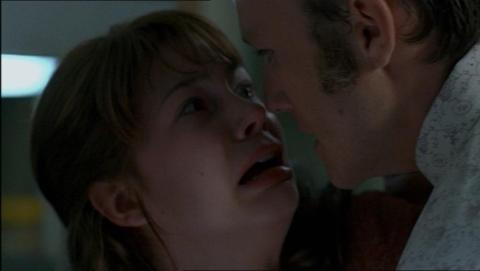
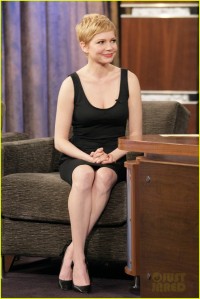 That’s Williams at her most extreme, the far end of the spectrum from her Interview Face. When she sits for interviews, she disguises her expressive mouth behind a lovely and enigmatic smile. She is very good at appearing so self-possessed as to be quite evasive, as if she’s an ideal 19th-century demure heroine.
That’s Williams at her most extreme, the far end of the spectrum from her Interview Face. When she sits for interviews, she disguises her expressive mouth behind a lovely and enigmatic smile. She is very good at appearing so self-possessed as to be quite evasive, as if she’s an ideal 19th-century demure heroine.
Get it, people? She is just beautiful — a woman with spectacular cheekbones and an ability to pull off that pixie haircut. If this was all we ever saw, I’d have nothing much to say.
If I’m going to be honest, I’ll admit that what I find so great about her mouth is that it has the same natural droop as some of those older women in my family — you can see it in photos of my hardworking, stone-faced granny when she was middle-aged and saddled with an alcoholic husband. You can see it in the family photos of those other abuelas who picked cotton and had too many children and worked in canneries and stayed poor all their lives.
So maybe part of my love for that mouth is the fact that she can harness it in her acting to evoke other lives.
Williams is still too young (she is 31) and too sweet-cheeked to show the lines around the mouth that my granny had, of course. But with characters like Emily Tetherow in Meek’s Cutoff (2010) and even Cindy in Blue Valentine (2010) she shows that she can look far older than she is, far too aware of the dark side, caught in vise-like gender traps.
She has that capacity to look emotionally bruised, resigned, on the brink. She somehow encompasses both fragility and a growing hardness.
I never watched her first big role in Dawson’s Creek (1998-2003) as Jen, the city girl who grew up too fast and got sent down to live with her grandmother in a more restrained setting. From the photos I’ve seen, she appears as a far more glamorous pretty girl than I’ve seen her from her career as the darling of independent film. I prefer the latter-day Williams, discovered and used to such effect by Kelly Reichardt in Wendy and Lucy (2008) and later in Meek’s Cutoff. To find someone to inhabit the roles of these quiet women who wrangle with overwhelming problems, Reichardt needed someone with a face.
Reichardt needed someone with a face that could indicate a complicated personal history because her films don’t belabor those back stories. You need to be able to look at Wendy’s face (below) and know that, when things get complicated, she might not have the strength to face it all, partly because she’s had to face hard things before.
I’ve been marveling lately at an emotion you don’t often see on American actors’ faces, but which British actors in particular excel at: self-disgust. Nor is this emotion limited to character actors with funny faces. This emotion is most striking when it appears on the face of a strikingly attractive person. I think I first noticed it when I saw Helen Mirren in Prime Suspect (maybe even that first series, all the way back in 1991), but I’ve seen Tilda Swinton, Richard Armitage, Pierce Brosnan (of all people) and even Hugh Grant (when he’s not being a toothy douchebag) show us that they can be susceptible to the same private self-loathing as the rest of us. Mirren and Swinton are especially good at showing us that expression when they look at themselves in bathroom mirrors.
Michelle Williams hasn’t quite gotten all the way to self-disgust. Or at least I haven’t seen it yet. But we see other dark moods cross her face that aren’t quite so clear-cut. And when they do, that’s when her acting becomes most lyrical.
She’s so good at becoming that character who goes inside herself, who shuts herself off as in Blue Valentine, or who flits between her fear of uncertainty and her temptations to adultery in Take This Waltz (2011). She’s one of those actors who fosters an extraordinary relationship with her viewers (perhaps even most her female viewers, who recognize those facial expressions?) because of her seeming isolation, her impulse to make herself invisible, and the emotional gymnastics it takes for fragile people to deal with isolation.
Sometimes it just takes a small purse of the lips. To allow one’s eyes to get a bit more hooded.
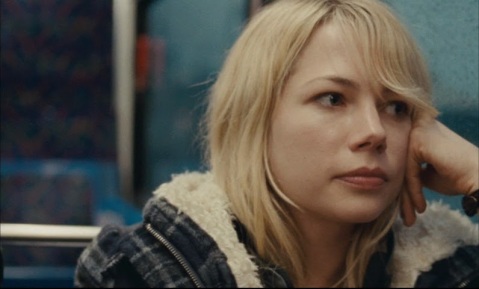
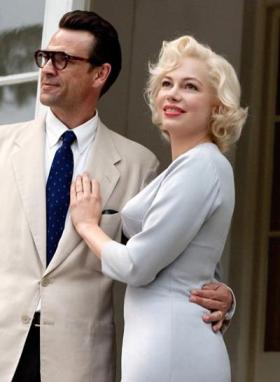
Which brings me back to the odd choice of opting to portray Monroe. Why would an actress do that to herself? Why would an actress be persuaded to step into the shoes of a woman so iconic, so famed for her beauty and full-to-bursting sensuality?
For Michelle Williams to take on the role of Marilyn Monroe is not equivalent to Meryl Streep’s roles as real-life/ historic figures. Honestly: to me it sounds like a nightmare. Who among us could survive the inevitable comparisons, the naysayers who say she’s not beautiful enough to play Monroe?
Yet after thinking so extensively about Williams’ mouth and its frequent on-screen plunges downward, its gravity and its evocation of disappointment and pain, I have now determined that this must have seemed like the most extraordinary physical challenge for an actor. She has spoken extensively about gaining weight for the role and learning how to wiggle across a room with curves (whereas Williams is normally a tiny slip of a thing, like all actresses these days).
Yeah, whatever. Actors are always gaining/ losing weight and making a big noise about it, like they want to be congratulated for how hard it is. If you ask me, the real challenge was to use her mouth differently, and thereby the rest of her face. She had to loosen up her mouth, widen her eyes, adopt a new openness and insecurity to convey a wholly different breed of fragility.
In a Vogue interview, Williams said some fascinating things about stepping into this part by thinking about Monroe’s relationship to the world:
Someone once said that Marilyn spent her whole life looking for a missing person — herself. And so she cobbled together what people thought, felt, saw, and projected onto her and made a person out of it. She had no calm center inside herself that she could come home to and rest.
The challenge was to play a person so eager to please, so eager to be visible. Marilyn’s mouth always conveyed her availability; even 50 years after her death, a photo of her will make you want to run your tongue all over her beautiful open lips. What could be a better challenge for an actor like Williams — who’s prone to such a rigid private reserve — than to try to become that woman who “had no calm center inside herself”?
It’s too bad My Week With Marilyn wasn’t a better film. But that’s really beside my larger point. Someday soon I’m going to rent it again just to watch again how Williams loosens up the bottom half of her face for the role, and think again about how it contrasts with her versions of hard, disappointed, downtrodden women like Alma and Wendy.
Is there another actor out there whose mouth does so much of the heavy lifting in her acting? And in the meantime, have you gotten around to seeing her in Take This Waltz yet?
Sense and nonsense
4 April 2010
When Liz Lemon decides to adopt a child in “30 Rock,” she radically cleans up her apartment to impress the adoption people — even to the point of getting “rid of all my Colin Firth movies in case they consider them erotica,” as she tells Jack Donaghy. (Jack nods knowingly, “That man can wear a sweater.”)
Erotica indeed. There are few guiltier girlie pleasures than a great kiss in a great love story. The kiss in the first “Twilight” film has been viewed millions of times on YouTube; even semi-cult favorites like the end of BBC’s “North and South” have hundreds of thousands of hits. One can find dreamy montage videos of love scenes posted by fans of virtually any show — from “True Blood” to “Queer as Folk,” “Bride and Prejudice,” “How Stella Got Her Groove Back,” and virtually anything with George Clooney.
But to be provocative, I’m willing to argue that 1) George Clooney has a long career of making films in which the attraction between characters doesn’t quite make sense, and 2) fans have a long history of accepting slightly nonsensical love stories because the kisses are so good, the stars are so pretty to look at, and because we want to believe that love and passion are somehow nonsensical. I think we should pause to fully appreciate those love stories that make sense.
Take, for example, one of the best Clooney films: “Out of Sight,” with the oh-so-perfect Jennifer Lopez (oh Jen, how far you’ve fallen since 1998). Stuffed together into the trunk of her car as Clooney escapes from prison and J-Lo waits for a chance to arrest him, they have an improbable conversation about movies: “Bonnie and Clyde,” “Network.” Most of this scene permits Clooney to demonstrate his skills in hamming it up. But there’s suddenly a moment when she takes the conversation seriously as they talk about Redford and Dunaway in “Three Days of the Condor.” “I never thought it made sense,” Lopez says, turning to Clooney. “You know, the way they got together so quick. I mean, romantically.” (Ahem: she’s right.) It’s brilliant: that very line is the shortcut that allows “Out of Sight” to get Clooney and Lopez together far more quickly than makes any kind of sense. It jump-starts their mutual attraction; they’re both so gorgeous that dream sequences must suffice till we see their characters finally undress for real.
The movies are full of love stories that simply pair up our beautiful leading men and women as speedily as possible. But c’mon, people, we can do better. Taking a quick look at great kissing scenes in the history of film, we quickly see that it doesn’t make sense that Greta Garbo falls in love with ridiculous Melvyn Douglas in “Ninotchka,” Ingrid Bergman with Cary Grant in “Notorious,” or Helena Bonham Carter with Julian Sands in “Room With a View.” Pleasurable, yes; but baffling in the light of day. So here’s my list-in-progress of love stories that are so gratifying because they make sense:
- Pride and Prejudice. Apologies for the obvious, but Colin Firth has a full six hours to cease being horrible, pine gratifyingly for Jennifer Ehle, and prove he’s worthy of her; Ehle learns some humility and that you can’t always tell a book by its cover. Accept no lame Keira Knightley substitutes.
- Before Sunset — and considering my distaste for Ethan Hawke, this love story’s got to be good. If the talkiness and the awkwardness of “Before Sunrise” somehow managed to work on you ten years earlier, it’s downright magical with the wary older versions of Hawke and Julie Delpy.

- Eternal Sunshine of the Spotless Mind. Clementine and Joel, perfectly flawed characters whose imperfect brains are bound up with each other despite those last few months (and brainwashing).

- LA Confidential. Russell Crowe’s Bud White wears his heart on his sleeve such that Kim Basinger sets aside her Veronica Lake persona to show him the real Lynn Bracken.

- Brokeback Mountain. Again, apologies for the cliché, but the lovely contrast of Jake Gyllenhaal’s eager personability with Heath Ledger’s tragic, laconic Ennis del Mar has to be one of the only opposites-attract stories that makes sense to me.

There’s got to be more. Tell me.

